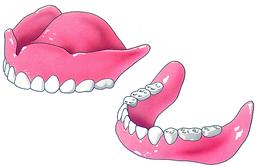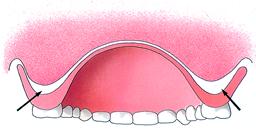Dentures – from your own teeth to dentures
Dentures - from your own teeth to dentures
From your own teeth to dentures
You will receive dentures. That is a big change, because your new dentures play an important role in chewing and speaking. In addition, your artificial teeth are very important for your appearance. After all, your teeth are your first eye-catcher.
Extracting teeth and molars
The extraction of teeth and molars usually does not happen in one go. The dentist first pulls your molars. Fit your teeth later. So they will remain in place for the time being, so that you will not run without teeth. There are usually several weeks between the extraction of the molars and the teeth. In the meantime, the gums are given the opportunity to heal and recover. So you will have to do without molars for a while. It's a bit difficult with food. If the wounds have not yet healed, it is best to eat soft foods. After that you can just eat what you normally used to. Usually your chewing ability will be less.
Make a print
Before the dentist extracts the teeth, he will make an impression of your jaw. This is done using an impression tray filled with a special impression material. In the dental laboratory, the impression is filled with plaster. This creates a plaster model. A well-fitting synthetic resin impression tray is made on this. Another impression is made with this spoon to get an even more accurate plaster model. Your dentures are made on this.
Are you satisfied with the colour, shape and position of your own teeth? Or maybe not? Inform your dentist about this before the dentures are made. Your dentist can advise you on this. He will try to take your wishes into account as much as possible.
The dentures are placed immediately
People used to go without teeth for a while before they got dentures. Nowadays that is no longer necessary. The dentures, also called immediate dentures, are placed in your mouth immediately after the last teeth have been extracted. So directly over the fresh wounds. You may find that a strange idea, but this has a great advantage. In the beginning, your dentures sit on the wounds like a kind of bandage.
When you look in the mirror, you probably have to get used to it. Your mouth is now an important eye-catcher and it has changed. Take a few days to get used to it and only then assess how you look with your new teeth.

The first day with dentures
Your new dentures will probably not feel comfortable on the first day. It can clamp and sometimes cause pain. Still, don't take it out of your mouth. Because your gums can start to swell afterwards, the dentures will no longer fit properly in your mouth.
Bleeding
The wounds may still bleed a little during the first hours after your teeth have been extracted. This can turn your saliva red. This will stop pretty soon. Then the saliva will also return to its normal color. That doesn't mean the wounds are completely healed. It is also better not to rinse for the first 24 hours. Blood clots form in the wounds. When you flush, those clots dislodge and the bleeding starts again. Drinking is allowed.
There is a small chance that the bleeding will not stop despite the precautions taken. Then warn your dentist. Also contact us if you are in pain. In any case, don't just take any painkiller. Some pain relievers can actually make bleeding worse. Discuss with your dentist what you should or should not do during the first 24 hours.
Getting used to dentures
The dentures may only be removed from your mouth after the first day. Depending on what you have agreed, your dentist will do this or you will do it yourself. Be careful of the wounds if you are allowed to do it yourself. Rinse the dentures and brush them clean. To clean your mouth, you can rinse it gently with lukewarm water. You can add a little salt if you like. You can also use a mouthwash with chlorhexidine available at the drugstore, for example Perio-Aid or Corsodyl. Rinsing with lukewarm chamomile tea is also very good. After a few days, the wounds will begin to heal and the pain will subside. You will then slowly get used to your dentures. That takes time. One will get used to faster than the other. Do you have a lot of trouble with it? Ask your dentist for advice.
Food
Eating with your new dentures is a bit uncomfortable. You will be careful, especially in the beginning. You yourself experience the best of what is possible and what is not. For the first few days, take soft foods, such as mashed potatoes, minced meat and soft fruit. Try a piece of fish and a potato a few days later. Later on you can eat food such as meat or an apple. It is better not to bite off pieces with dentures. Therefore, cut your food into pieces and chew calmly and evenly with your new artificial teeth. Take a piece of food in the mouth on both sides. Take a little more time than you used to.
To talk
With your new dentures you talk a bit awkwardly at first. For example, you lisp. Or certain sounds sound different than you were used to. It's like talking with your mouth full. This is normal. Your mouth still has to get used to your new dentures. Usually it gets a lot better after a few days. Practice extra with those words or letters that don't quite sound to your liking yet. For example, read the newspaper aloud.

Regular cleaning of dentures
The dentures
Your dentures are still new and beautiful. Of course you want to keep it that way. That is why, just like with your own teeth, you must take care of your dentures. If you don't clean it regularly, food residue will remain. Both on your dentures and underneath. If you don't remove it, your gums can eventually become inflamed. Therefore, clean your teeth carefully after every meal. Use a special denture brush, for example from Lactona or Oral-B, and water to properly remove food residues. Do not use toothpaste. It can rub too much. Clean dentures always feel smooth. Don't let your smooth teeth slip out of your hands during cleaning. It will break. To be on the safe side, first fill the sink with water and clean your teeth above it.
Clean your dentures daily with a cleaning agent available at the drugstore or pharmacy. Follow the manufacturer's instructions. If necessary, ask your practitioner or dental hygienist for advice. In any case, place your dentures in a cleaning agent overnight once a week. This prevents the formation of tartar on your dentures. Then brush your dentures well and rinse them with water. Never put your dentures in hot water and certainly do not use bleach or abrasives.
Also clean your mouth
In addition to your dentures, keep your mouth clean. In the beginning, if the wounds have not completely healed, rinse your mouth with a little lukewarm water after each meal. After that, it is better to brush your gums with a soft toothbrush. Use regular fluoride toothpaste for this. At least once a day, use a soft toothbrush to massage the mucous membrane on which your dentures rest: your jaws and the transition from the jaw to the cheeks. Also brush your palate, because there can also be food residues there.

Sleep with or without dentures
Your jaws need some time to get used to the dentures. Leave your dentures in your mouth at night for the first week. After that, it is better to take it off before going to sleep. That way you also give your jaws a rest. Do you find it annoying to sleep with an empty mouth? Then remove only the lower teeth. Do you still want to wear your entire denture day and night? Have your mouth and dentures checked by your dentist at least once a year.
Do you not have the dentures in your mouth? Then keep it in a glass of water. Change the water every day. You can also store your dentures in a glass filled with a cleaning agent. Always rinse your dentures well with water before putting them back in your mouth.
Denture adjustments
After some time you will feel that your dentures are a little looser. That's right. The wounds have healed, and your jaws have shrunk slightly. This creates space between your jaw and your dentures. After about six weeks, or rather a little longer, the dentist can adjust your dentures. He can put a new layer or 'lining' in your dentures, making it more solid again. In most cases you will then have to miss your dentures for one or two days.
Once a prosthesis, forever ready?
Over time you will get used to your new artificial teeth, but this will not last. Your mouth changes because your jaws shrink. Your dentures will remain the same size. Space will then be created between your overdenture and your jaw, which will eventually make your dentures looser. If your dentures no longer fit properly, they may put more pressure on some places on your jaw than others. That can cause pain. Then go to your dentist. Do not sand or file your overdenture yourself! In such a case, your dentist will adjust your dentures or advise you to make a new overdenture. This is often necessary after a year.

Monitoring by your practitioner is important
To prevent pain and to be able to detect loosening of your dentures in good time, it is advisable to visit the practitioner for a check-up at least once every two years. Go even if you have no complaints. The shrinking of your jaws goes very unnoticed. So you will not notice it at first. Your practitioner can make your dentures fit properly again. Or he can advise you to get a new one in time, because dentures can also wear out. The practitioner also checks whether your mouth is still healthy. Especially people with ill-fitting dentures or people who have been wearing their dentures for years can get annoying mouth defects.
Adhesive pastes, adhesive powders and other aids
There are all kinds of adhesive pastes, adhesive powders and 'liners' on the market to give dentures more hold. These resources are actually all emergency solutions. The cause of the problem is not really removed. Never put cotton wool under your dentures. Your jaws will only shrink faster. Are your dentures coming loose? Then go to your practitioner. He usually immediately sees what is going on and can give you the best advice.